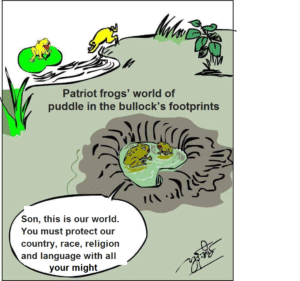“Israel is Preparing a ‘Backyard’ in Cyprus… This Cannot But Sound the Alarm for Us”
ByR Powell June 27, 2025
As war rages in Gaza and regional escalation with Iran deepens, a quiet but dramatic shift is unfolding just across the Mediterranean. Cyprus, long seen as a neutral tourist haven, is now absorbing thousands of Israeli nationals — many of them settlers, elites, and fleeing civilians — in a wave that is transforming the island’s demography, economy, and politics.
According to Cyprus’s main opposition party AKEL, this is no ordinary migration. It is, in their words, the construction of “a backyard” — a satellite enclave of Israeli influence, economic power, and potential intelligence infrastructure, rising just beyond the reach of missiles, but still close enough to matter.
“Israeli buyers are purchasing significant land parcels and strategic economic assets,” warned AKEL spokesperson Stefanos Stefanou in June. “They are building Zionist schools, synagogues, gated enclaves… Israel is preparing a backyard in Cyprus, and this cannot but sound the alarm for us.”
A Three-Wave Exodus: From Pandemic to War
The Israeli presence in Cyprus has expanded in three clear waves:
- The Pandemic Wave (2020–2021):
During COVID-19, many affluent Israelis fled strict lockdowns and a strained health system for Cyprus’s EU-standard care and relaxed lifestyle. Property sales surged in resort towns like Paphos and Limassol. - The Judicial Reform Crisis (2023):
As Prime Minister Benjamin Netanyahu launched controversial judicial reforms, mass protests erupted across Israel. Thousands began to hedge their bets — and their real estate — by acquiring homes abroad. Cyprus, just 40 minutes by air, became a popular fallback. - The War and Retaliation Wave (2023–2025):
The most recent and explosive surge began after October 7 and intensified with Iran’s missile strikes on Tel Aviv and Haifa. With air routes disrupted and a growing sense of national vulnerability, thousands fled. According to Chabad Cyprus, over 12,000 Israelis passed through their centers in just 10 days, seeking food, shelter, and emergency repatriation services.
Town-by-Town: A New Geography of Influence
The numbers tell a striking story.
- Limassol: 1,154 Israeli property purchases (511 with title deeds), with heavy clustering in spa and luxury resort areas like Pyla, Ormideia, and Pervolia.
- Paphos: 1,291 property transactions by Israelis, including 867 full title deeds.
- Larnaca: 1,406 purchases (481 deeds), particularly close to the airport and Chabad’s main synagogue in Pyla.
In total, nearly 4,000 Israeli-linked properties have been acquired across southern Cyprus since 2021.
Real-estate consultant Loizos Loizou told Cyprus Mail:
“Israelis tend to buy large land parcels, featuring spas and resorts — gated communities, so to speak. Pyla has become their unofficial hub.”
“A Second Israel” — Population Doubling in 5 Years
In 2018, about 6,500 Israeli nationals resided in Cyprus. By mid-2025, that number has more than doubled to approximately 15,000 — and growing. This includes entire families, business owners, and settlers fleeing West Bank outposts amid regional instability.
Chabad reports show that:
“More than 12,000 Israeli Jews passed through our six houses in 10 days during the Iran crisis,” said Rabbi Zeev Raskin. “Many of them had no plans to return.”
Locals Alarmed: “Land Doesn’t Belong to Us Anymore”
AKEL’s fears are not limited to real estate. In their June address, the party highlighted national security, economic justice, and cultural sovereignty:
“At some point, we’ll discover our own land doesn’t belong to us,” said Stefanu. “These are not just holiday homes. These are settlements in all but name.”
The pattern is familiar. Enclaves emerge. Locals are priced out. Infrastructure — synagogues, kosher supermarkets, private schools — is built quickly. The same settler-colonial template used in the West Bank now appears to be taking root in places like Pyla and Limassol.
Cypriot media outlets, including Politis and Cyprus Mail, have published growing numbers of investigative reports about gated communities, property speculation, and political pressure to crack down on Golden Visa abuse.
Strategic Concerns: Mossad, RAF Bases, and Foreign Control
Security experts have also raised concerns. A Haaretz exposé recently confirmed that Israeli intelligence agencies are active in Cyprus, using the island for “safehouse operations” and staging points. Cyprus also hosts RAF Akrotiri, a major British military base used for reconnaissance missions over Gaza — further complicating the geopolitical picture.
In Turkish-administered Northern Cyprus, land purchases by Israelis have been drastically restricted, with authorities imposing new regulations. But in Greek-administered areas, no such constraints exist — and bilateral agreements between Cyprus and Israel are shielding the real estate boom from meaningful oversight.
“Cyprus cannot afford to become a forward operating base for another state,” one European security official warned. “It risks destabilising the island and compromising its neutrality.”
Faith, Flight, and a Fading Zionist Dream
At the heart of this phenomenon lies a powerful contradiction: If Israel is a divine homeland, why are its people abandoning it?
Many of the Israelis relocating to Cyprus are not rejecting Zionism — they’re exporting it. They bring with them the ideologies, infrastructure, and investment strategies that have transformed Palestine into a patchwork of enclaves. And now, as they take root in Cyprus, many locals fear they are watching the early stages of a new settler project.
The Israeli state is doing everything it can to reverse the trend. El Al has launched discounted repatriation flights. Media campaigns appeal to patriotism. But many have tasted the safety, prosperity, and freedom of life abroad. And they are not coming back.
“We tried to go to Israel by yacht, by helicopter,” said one Israeli evacuee to The National. “But Cyprus just felt safer. For now, we’ll stay.”
A Nation at a Crossroads
What began as a trickle of Israeli tourism has become a full-blown demographic shift. What some once called a “second home” now feels like a “second Israel.” And for Cyprus, a country still grappling with its own partition and history of foreign interference, the warning signs are clear.
As Stefanos Stefanou put it:
“This cannot but sound the alarm for us. We must ask — are we selling homes, or are we selling sovereignty?”






